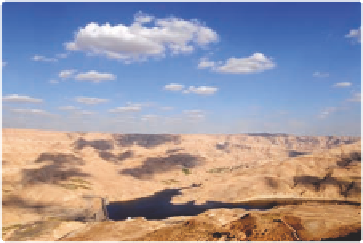Travel Reference
In-Depth Information
The only place to stay in the reserve is at the
fifteen-room “Chalet Village” on the shores of the
Dead Sea's Madash peninsula. The chalets are a
short walk to the visitor centre and the entrance
to the stunning Mujib canyon, where you can
hike through deep gorges of red sandstone lined
with palm trees. The “Siq Trail” (2hr) follows
the main gorge of the Mujib River to a waterfall
where you can swim in a large pool, while the
more challenging “Malaqi Trail” (6-8hr) takes
you up into the surrounding mountains, where
you can picnic by natural pools and then follow
the river trail on an exhilarating trek down
the Mujib gorge (wearing buoyancy aids and
sometimes holding onto ropes), before abseiling
down a 20m waterfall and returning to camp.
The Wadi Mujib Reserve is the lowest nature
reserve in the world and is home to a diversity
of wildlife, including red foxes, mongooses,
Arabian leopards and the beautiful Nubian ibex
- the subject of a captive breeding programme
managed by Jordan's Royal Society for the
Conservation of Nature (RSCN), which uses
tourism profits to fund its valuable work.
Tramping along a river rollercoaster of torrents
and pools might not be the classic way to spend
time in a nature reserve, but this adrenaline-
charged adventure is just as beneficial to wildlife
conservation as are the guided birdwatching and
hiking tours, albeit somewhat wetter.
160 dIvIng In MnAzI BAy MArInE
pArk, TAnzAnIA
Southern Tanzania is the place to go if you're
looking for unspoilt reefs. Marine biologist and
conservationist Martin Guard runs a PADI
centre in the quiet fishing village of Mikindani
in Mtwara, from where he takes divers to the
200-square-kilometre Mnazi Bay Marine Park
- a little-visited protected area full of coral and
fish species. You're likely to see large turtles
and giant groupers as well as channel and patch
reefs, spectacular drop-offs and extensive spur
and groove formations.
Accommodation is next door to the centre at
Ten Degrees South - an English-owned rustic
retreat with a bar and seafood restaurant staffed
by locals. The dive centre also doubles as a
marine research and environmental education
centre. A levy of US$1 from every dive goes to a
fund for the local Naida community, while US$10
is taken from each diver's daily fee to help the
marine park authorities keep this untouched
area pristine and ensure the diving remains
world-class.
Need to know
Mikindani is approximately 500km
(8hr) from Dar Es Salaam by road. For prices,
reservations and details of the research volunteer
programme see
W
www.eco2.com;
T
+255 (0) 784
855 833. Further info on Ten Degrees South is at
W
www.tendegreessouth.com.
Need to know
The Siq and Malaqi trails are open
April-Oct. The only way to reach the reserve is by
car (90min from Amman). Independent hiking or
camping is not allowed in the reserve and as the
gorge is prone to flash flooding it's essential to go
with a local guide. Numbers
of guided tours are strictly
limited to only those
run by RSCN-approved
operators. For entrance
fees to the reserve, guiding
charges, trail opening times,
directions and reservations
see
W
www.rscn.org.jo;
T
+962 6533 7931.
161 rIvEr TrEkkIng In THE
MuJIB nATurE rESErvE, JordAn
Wadi Mujib canyon
Desert and drought define much of the wild
areas of the Middle East, but there are
nonetheless pockets of fertile, wildlife-rich areas
if you know where to look. One particularly
biodiverse region is the Mujib Nature Reserve in
the west of Jordan, where the waters that flow
from the highlands to the Dead Sea provide ideal
conditions for river trekking in the wet season.






















Search WWH ::

Custom Search